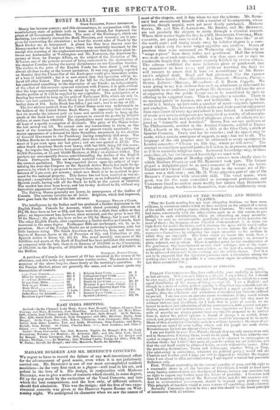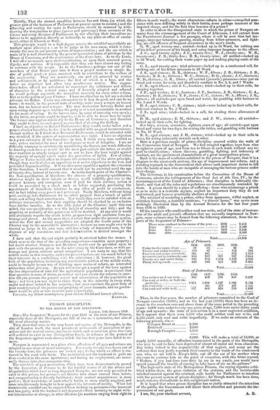MUTUAL ADVANCES OF THE WORKING AND MIDDLE CLASSES.
[That the Leeds meeting has not been altogether fruitless, we have some evidence, in numerous letters which we have received on the subject of a union of the middle and workiug classes, chiefly from Chartists. We wish we could find room, consistently with the other claims upon us at this season, to give publicity to such contributions, which are interesting on many accounts ; though we note an uubusinesslike peculiarity of manner which pervades the most of them : the language of our Chartist correspondents is at times too high-flown for useful discussion, and it overruns the space which would suffice to state their arguments in plainer phrase ; it even injures the effect of the arguments themselves, by attracting too much attention to the medium in which they are conveyed. The letter which we insert this week, from a member of the middle c'ass, is an example of the contrary : its manner is plain, tolerant, and practical. There is another point for the consideration of the gentlemen who have favoured us with their writings : two of the repre- sentatives of the Chartists have sent a letter, as the first of a series, proposed to be addressed alternately to the working and the middle classes. Now it is not to be supposed that the Spectator possesses such a circulation among the working class at large as to make it a convenient organ for addressing them. Let them reconsider this.]
TO THE CHARTISTS OF ENGLAND.
FELLOW COUNTRYMEN—YOU have suffered for your credulity in listening to bad advisers. Will you now listen to a friend? I am a friend, for I should be ever ready, if it were general and not individually only, to submit to a more equal distribution of the means of living amongst all. I am a Radical ; and though in a state of society perfect equality is altogether impracticable and ab- surd, I hold that a benevolent Providence intended a much greater degree of equality than the seltialmess and wickedness of mankind has hitherto suffered to prevail. I am not even an alarmist about revolutions, if they would redress a country's wrongs and be productive of permanent good : but they must be without violence and bloodshed; for I hold that in point of morals, we are bound to make a just calculation of all the consequences, both general and par- ticular, remote as well as immediate ; and front experience we know that the evils of anarchy are always greater than any benefits proposed to be derived from it, unless the public opinion in favour of change is so settled, deter- mined, and preponderating, that no resistance would be attempted to be made. Short of this, revolution invariably ends in a military tyranny ; the reins of go- vernment are seized by some ruffian officer, and the people are matte slaves. Revolutionary leaders are almost always knaves. I am not hostile to your Five Points; though they are only means to an end, and in themselves, if resting there, would do no good. You have hitherto con- cealed or suppressed. what your real ends are, as if ashamed to contemplate or disclose them : but I think that some of your five points are not judicious, and that the end itself would lie obtained before, or even without the means. After the preceding declarations, Tories and Aristocrats, whether 'Whig or Tory, (for aristocracy is aristocracy, whatever its political party,) would call me Chartist and leveller ; and I hope you will be disposed to consider the sugges- tions I am about to offer, notwithstanding I call myself a radical but peaceable Reformer only. First. Without contending for the natural equality of man, and his right to a reasonable share in all the bounties of Providence, I would at least have every burden removed from the shoulders of labour, because our ancestors had no right to impose any burden upon the labour of posterity. I therefore hold that all taxation arising out of the National Debt, and the idle expenses inci- dent to aristocratical government, should he imposed upon property only. This principle of taxation would at once remove all squabbling about economy.
Secondly. Commerce should be free ; and this should be the broad principle of intercourse with all nations.
Thirdly, That the eternal squabbles between Ins and Outs, (in which the greater part of the business of Parliament at present seems to consist,) and the scheming and anxiety for seats in Parliament, should be removed by with- drawing the temptations to place (power and patronage) from servants of the Crown and every Member of Parliament, by not allowing their immediate re- latives to be appointed, directly or indirectly, to any place or office of emolu- ment, either in Church or State. This principle would in a high degree remove the mischief unavoidably at- tendant upon allowing a can to be judge in his own cause, which is noto- riously the case in our present system of representation ; and the use which is made of it is well illustrated by the present tyrannical claim of privilege by the House of Commons, and the continuance of the Corn-laws. As to the Lords, I will offer no remark upon their constitution, or upon their assumed power, dignity, and notions. It is impossible that they can have almost any feeling in common with the people. As to the Commons, perhaps not one of the members of that House goes into it from a proper motive—a simple de- sire of public good—a pure, unmixed wish to contribute to the welfare of the community. They are notoriously, one and all, actuated by avarice and self-interest, or by ambition ; the first of which is a base, and the latter an imperfect and often very mischievous motive. The sugges- tions before offered are calculated to counteract the selfishness and defects of character in the natural man ; and if honestly adopted and adhered to, would perhaps supersede the immediate necessity. for every other reform. But as to the points of your Charter. I have no objection to, but am a decided advocate for Ballot. Under any circumstances it may do good, and can do no harm : it would, in the present state of society, make many a rogue an honest man, but no honest man a rogue. The true distinction between Ballot and open voting depends upon whether the party is or is not accountable to another for his mode of voting. In the former case, he must of necessity vote openly ; in the latter, no person ought to inquire, or to be able to know bow he voted. The former case applies manifestly to the House of Commons ; and therefore they ought to have no such power as even that of clearing the Gallery. I have no objection to Annual Parliaments : they would, under ballot and a proper elective flanchise, be fon sl to be attended with no great inconvenience; though neither do I think that Triennial Parliaments would be attended with any mischief, if the system of representation were right. I have no objection to a great extension of the franchise : in fact, I think every man entitled to vote, unless excluded for want of intelligence or want of integrity. I see no difficulty whatever in satisfactorily ascertaining the former, nor much difficulty in drawing such lines as would for the most part exclude the latter, or render their numbers so utterly insignia cant as not to have the least weight against the majority of upright voters under the protection of ballot. Few of either Whigs or Tories would affect to dispute the correctness of the above principle, though they would shelter an opposition to it under objections to the test, and pretended impracticability. If it would remove squabbles against the extension of the franchise, I would consent that it should not be exercised until the age of twenty-five, instead of twenty-one. As to the fourth point of the Charter— the Non-qualification of Members: the absence of a property-qualification, whatever might be their talents or fitness, would infallibly give rise to the grossest knavery and corruption, even if paid for their services, unless it could be prevented by a check such as before suggested, precluding the appointment of immediate relatives to any office of profit or emolument, and in fact taking away power and patronage. Needy Members, without being paid, could go into Parliament for no other purpose than a breach of public trust, and selling their constituents. Nor would they ever be satisfied with an ordinary remuneration, but their cupidity should be checked by an exclusion from further benefits. As to the fifth point of the Charter: until this was added, the non-qualification was the height of absurdity and folly ; and the propriety or necessity of this point may well be doubted. At any rate it would still absolutely require the check before proposed—a rigid exclusion from pa- tronage and power. At the same time, I admit that under the present system, unless the first and second suggestions are adopted, the fourth point of the Charter may be the unavoidable alternative ; because no man ought ever to be trusted as judge in his own case, still less a body of interested men, for the disgrace of any scandalous and foul determination is divided amongst the whole.
I have said that the end might probably be attained before the means. 1
think so as to the first of the preceding suggestions—taxation upon property ; but doubt whether Ministera and Members would ever be prevailed upon to part with the premium given to the aristocracy by the Corn-laws, or with pa- tronage and power, without actual compulsion. 1 am sorry to say, that the middle-ranks in this country, under our present system, are too much bribed by their interests to a confederacy w ith the aristocracy : if, however, the great bulk of the population, including any considerable portion of the middle ranks, could be brought to one way of thinking upon modes of reform, an interested aristocracy must give way. As you will never get a repeal of the laws against the free importation of corn till the agricultural population is convinced that that question is none of theirs, so neither wi 1 you obtain the reforms in ques- tion till you procure the general assent and concurrence of the population at large : nor have you any right to claim them, as the minority in every state ought and must submit to the majority ; but once convince the great body of your countrymen of the justice and propriety of your demands, and no govern- ment would be able or dare to resist your importunity. I remain, my fellow countrymen, your sincere friend and honest adviser,
RADICAL.



























 Previous page
Previous page